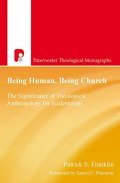Being Human, Being Church: The Significance of Theological Anthropology for Ecclesiology

Being Human, Being Church: The Significance of Theological Anthropology for Ecclesiology
By Patrick Franklin
One's conception of human personhood deeply impacts one's understanding and practice of community. Contemporary culture lacks precision and agreement in defining the human person. Such ·anthropological agnosticism· also affects the church. leading to devastating consequences concerning its inner sociality. cultural engagement, and pursuit of justice. This dissertation argues that a significant step forward is to gain a better understanding of theological anthropology and apply it consistently to ecclesiology. Specifically. a theological understanding of the human person as a relational. rational. and eschatological creature leads to a conception of the church as relational. rational, and eschatological communities of the new humanity. This approach overcomes problematic dualisms and false dichotomies presently plaguing the church's inner life and outward mission, in part by accentuating the ethical dimension that pervades its whole existence. Primary conversation partners include Dietrich Bonhoeffer, Miroslav Volf. and Stanley Grenz. Alasdair Macintyre and Wolthart Pannenberg are also influential.
Part I consists of two chapters. Chapter one explores the difficulties of defining the human person in contemporary culture and the resulting consequences for community and ethics. Chapter two analyzes six typological ways of construing community based IV upon conflicting views of the human person. It evaluates the strengths and weaknesses of each, concluding that none is fully satisfying theologically.
Part II (chapters 3-5) constructs a theological anthropology in trinitarian perspective. It presents a threedimensional view of the human person as: a relational creature whose telos is to love God and fellow human beings; a rational creature whose telos is to know God and understand God"s world; and an eschatological creature whose telos is to serve God as a stewardpriest of (new) creation.
Part III (chapters 6-8) constructs an ecclesiology corresponding to the themes developed in Part II. depicting the church as relational, rational, and eschatological communities of the new humanity defined and oriented by love. faith. and hope. The concluding chapter summarizes the arguments developed and their implications for Christian community and ethics. It then explores some preliminary implications of viewing the church as God"s new humanity. called to promote and embody the welfare and flourishing of all human beings.
Read or Buy OnlinePeer Reviewed Book
ISBN/ISSN: 978-1842278420
Published in: 2016